Religious diversity is both a beautiful and nasty thing. On the one hand, it’s beautiful that various people see complicated stuff such as religion or spirituality differently, depending on the way they were raised, the way they view the world, and so on. On the other hand, when people from some religions start hating others just because they don’t believe in the stuff they do, it becomes a hurtful thing. Like in today’s story, where a non-denominational spiritualist couple gets their marriage called a sham by a Catholic family member who believes a “real” wedding should have a priest. More info: Reddit Some people can’t wrap their heads around the fact that not everyone believes the same things they do Image credits: Zetong Li (not the actual photo) A couple who believe in God but don’t devote themselves to any religion had a non-denominational wedding ceremony, which one of their aunts couldn’t attend, so she sent a gift instead Image credits: Yan Krukau (not the actual photo) Image credits: WeddingPresentDrama But when the aunt learned that there was no priest at the wedding, she said that it meant the marriage wasn’t real and asked them to return the gift Today’s OP considers themselves a non-denominational spiritualist despite being raised Catholic. When a person identifies as being “spiritual but not religious” (or other variations like “spiritual but not affiliated,” “more spiritual than religious,” and so on), it means that their spirituality doesn’t regard organized religion as the way to further spiritual growth. According to Pew Research, typically, American people who identify as being spiritual but not religious are relatively young, as 58% of them are between the ages of 18 and 50. Also, the same research revealed that 22% of these Americans identify this way because they deem spirituality, but not religion, important in their lives. This kind of aligns with the original poster’s explanation, which explained it as believing in God but not being sure which religion is right. For some reason, they hope the right religion isn’t Catholicism, quite likely due to the fact that they were raised Catholic, but, hey, let’s not open this can of worms right now. Their wife, who wasn’t raised Christian, has a similar stance to them. So, it’s no surprise their wedding ceremony was non-denominational. Non-denominational wedding ceremonies shouldn’t be confused with secular weddings. Simply said, the latter one doesn’t typically include any religiousness, while a non-denominational one isn’t tied to religion but can have certain religious references throughout. So, since the OP said that both they and their wife are spiritual, not religious, a non-denominational ceremony was probably the best choice for them. After all, it’s their wedding, and they should be able to do what they want, shouldn’t they? But not everyone thought that. The author’s aunt couldn’t make it to the wedding, so she sent a gift from the registry instead. Typically, a wedding registry is a list that couples make of what kind of gifts they would prefer to get for this special occasion. This helps prevent unwanted or duplicate gifts, as well as gives suggestions to guests who can’t come up with a good enough present idea themselves. Yet, usually, it is not that the couple needs only gifts from the registry and won’t accept anything else. For example, if a guest cannot afford anything from this list or they come up with something way better or more personal, they are allowed to go rogue, even if that means they risk not getting the couple what they want for sure. Well, the aunt didn’t take this risk. But she kind of did take another one — after learning that there was no priest at the wedding, she declared that it meant the couple weren’t actually married. Image credits: Kawê Rodrigues (not the actual photo) Well, she touched on quite an interesting topic here. In legal terms, people who sign a marriage certificate, or any other similar legal document, are married, no matter how religious their wedding was. Yet, in some places, not all people who would like to get officially married can do that if, for instance, same-sex marriage isn’t legalized. Fortunately, more and more countries every year are moving towards such legalization. From the context given by the OP, it seems that the legality of their marriage isn’t a question in this story, but religion is. Or rather, it’s a problem invented by the author’s aunt, in whose world a wedding must be highly religious to be real. So, since she deemed this marriage not real, she wanted the gift she gave back. But the newlyweds refused to give it back because who ungifts a wedding present? Well, apparently, the original poster’s aunt. And she isn’t the only person like this in the world. For instance, on a Stack Exchange blog, another person shared their story about being asked to return a gift. Since both situations differ a little bit, the answer to this one might not apply to today’s main story, so we’re not going to analyze it. We just want to note that maybe people like the aunt in today’s story aren’t as rare as one might expect. As there are many people with various views towards gift giving, there are just as many opinions on how people should handle such a situation. For instance, the author’s mom didn’t agree with her sister’s views, but she still thinks the couple should return the gift. On the other hand, people online thought differently. They agreed with the author that ungifting a present is just a rude thing to do, as is invalidating someone else’s marriage just because they’re not as religious as you. While it’s sad that the OP and their aunt’s relationship is taking quite a hit due to this situation, at the same time, the couple’s stance on the gift and on their marriage validity is justifiable. Let’s just hope that maybe the aunt will be able to understand the nastiness of her actions in the future. The couple refused to do that because, just as people online said, it’s rude to ungift a present and invalidate someone else’s marriage Image credits: Anya Juárez Tenorio (not the actual photo) The post Aunt Asks Couple To Return Wedding Gift Because She Doesn’t View Their Marriage As Real first appeared on Bored Panda.Aunt Asks Couple To Return Wedding Gift Because She Doesn’t View Their Marriage As Real
Religious diversity is both a beautiful and nasty thing. On the one hand, it’s beautiful that various people see complicated stuff such as religion or spirituality differently, depending on the way they were raised, the way they view the world, and so on. On the other hand, when people from some religions start hating others just because they don’t believe in the stuff they do, it becomes a hurtful thing.
Like in today’s story, where a non-denominational spiritualist couple gets their marriage called a sham by a Catholic family member who believes a “real” wedding should have a priest.
More info: Reddit
Some people can’t wrap their heads around the fact that not everyone believes the same things they do
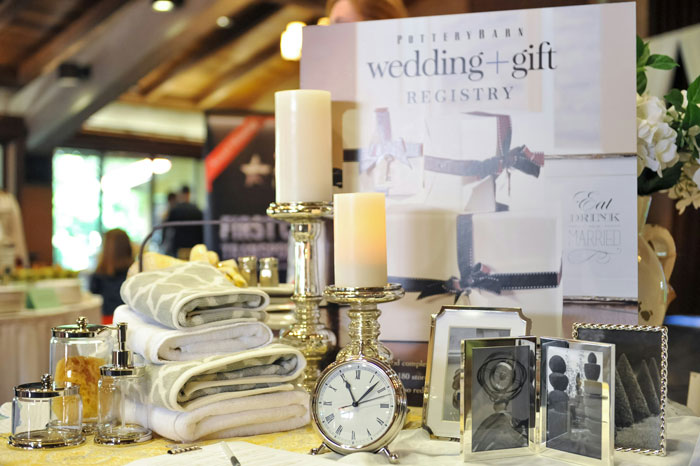
Image credits: Zetong Li (not the actual photo)
A couple who believe in God but don’t devote themselves to any religion had a non-denominational wedding ceremony, which one of their aunts couldn’t attend, so she sent a gift instead
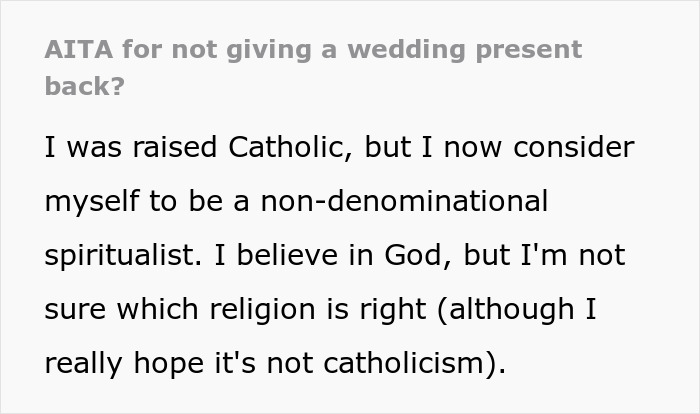

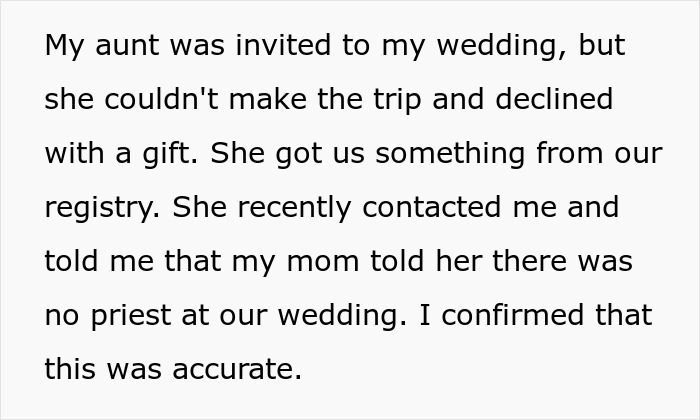

Image credits: Yan Krukau (not the actual photo)


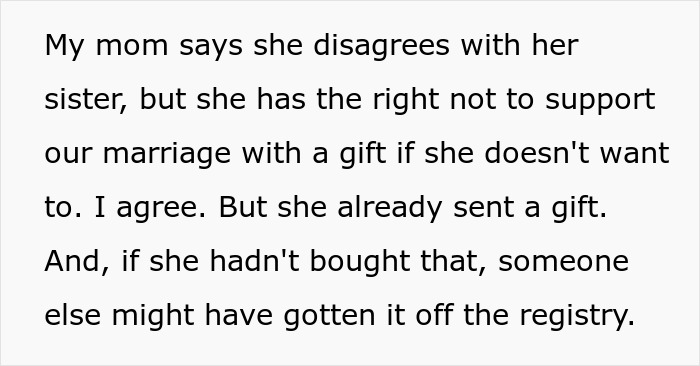

Image credits: WeddingPresentDrama
But when the aunt learned that there was no priest at the wedding, she said that it meant the marriage wasn’t real and asked them to return the gift
Today’s OP considers themselves a non-denominational spiritualist despite being raised Catholic. When a person identifies as being “spiritual but not religious” (or other variations like “spiritual but not affiliated,” “more spiritual than religious,” and so on), it means that their spirituality doesn’t regard organized religion as the way to further spiritual growth.
According to Pew Research, typically, American people who identify as being spiritual but not religious are relatively young, as 58% of them are between the ages of 18 and 50. Also, the same research revealed that 22% of these Americans identify this way because they deem spirituality, but not religion, important in their lives.
This kind of aligns with the original poster’s explanation, which explained it as believing in God but not being sure which religion is right. For some reason, they hope the right religion isn’t Catholicism, quite likely due to the fact that they were raised Catholic, but, hey, let’s not open this can of worms right now. Their wife, who wasn’t raised Christian, has a similar stance to them. So, it’s no surprise their wedding ceremony was non-denominational.
Non-denominational wedding ceremonies shouldn’t be confused with secular weddings. Simply said, the latter one doesn’t typically include any religiousness, while a non-denominational one isn’t tied to religion but can have certain religious references throughout. So, since the OP said that both they and their wife are spiritual, not religious, a non-denominational ceremony was probably the best choice for them. After all, it’s their wedding, and they should be able to do what they want, shouldn’t they?
But not everyone thought that. The author’s aunt couldn’t make it to the wedding, so she sent a gift from the registry instead. Typically, a wedding registry is a list that couples make of what kind of gifts they would prefer to get for this special occasion. This helps prevent unwanted or duplicate gifts, as well as gives suggestions to guests who can’t come up with a good enough present idea themselves.
Yet, usually, it is not that the couple needs only gifts from the registry and won’t accept anything else. For example, if a guest cannot afford anything from this list or they come up with something way better or more personal, they are allowed to go rogue, even if that means they risk not getting the couple what they want for sure.
Well, the aunt didn’t take this risk. But she kind of did take another one — after learning that there was no priest at the wedding, she declared that it meant the couple weren’t actually married.
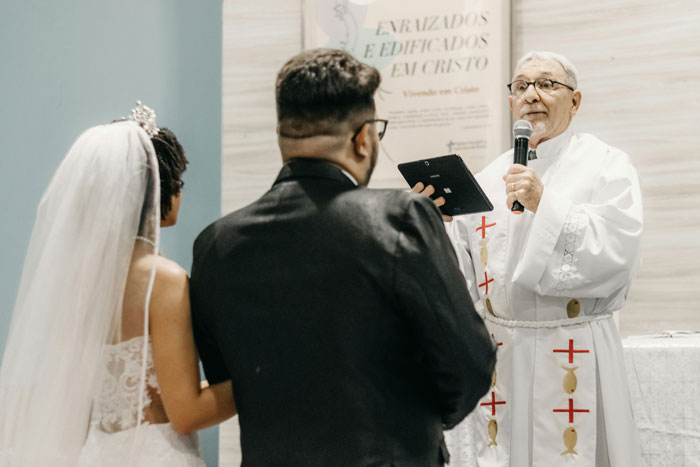
Image credits: Kawê Rodrigues (not the actual photo)
Well, she touched on quite an interesting topic here. In legal terms, people who sign a marriage certificate, or any other similar legal document, are married, no matter how religious their wedding was. Yet, in some places, not all people who would like to get officially married can do that if, for instance, same-sex marriage isn’t legalized. Fortunately, more and more countries every year are moving towards such legalization.
From the context given by the OP, it seems that the legality of their marriage isn’t a question in this story, but religion is. Or rather, it’s a problem invented by the author’s aunt, in whose world a wedding must be highly religious to be real.
So, since she deemed this marriage not real, she wanted the gift she gave back. But the newlyweds refused to give it back because who ungifts a wedding present? Well, apparently, the original poster’s aunt.
And she isn’t the only person like this in the world. For instance, on a Stack Exchange blog, another person shared their story about being asked to return a gift. Since both situations differ a little bit, the answer to this one might not apply to today’s main story, so we’re not going to analyze it. We just want to note that maybe people like the aunt in today’s story aren’t as rare as one might expect.
As there are many people with various views towards gift giving, there are just as many opinions on how people should handle such a situation. For instance, the author’s mom didn’t agree with her sister’s views, but she still thinks the couple should return the gift.
On the other hand, people online thought differently. They agreed with the author that ungifting a present is just a rude thing to do, as is invalidating someone else’s marriage just because they’re not as religious as you.
While it’s sad that the OP and their aunt’s relationship is taking quite a hit due to this situation, at the same time, the couple’s stance on the gift and on their marriage validity is justifiable. Let’s just hope that maybe the aunt will be able to understand the nastiness of her actions in the future.
The couple refused to do that because, just as people online said, it’s rude to ungift a present and invalidate someone else’s marriage





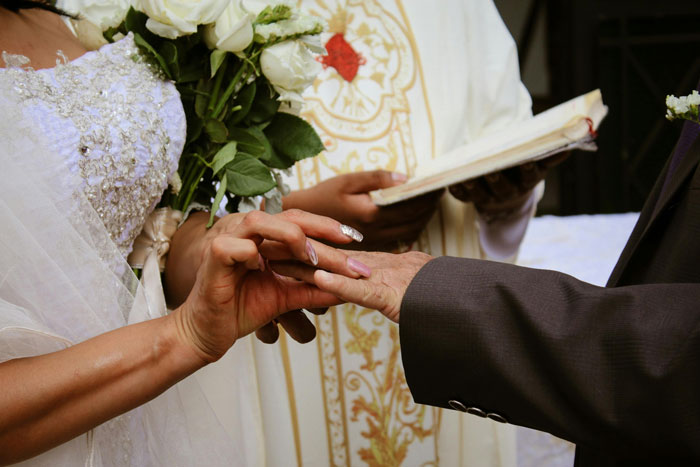
Image credits: Anya Juárez Tenorio (not the actual photo)





from Bored Panda https://ift.tt/EMpBSDX




No comments: